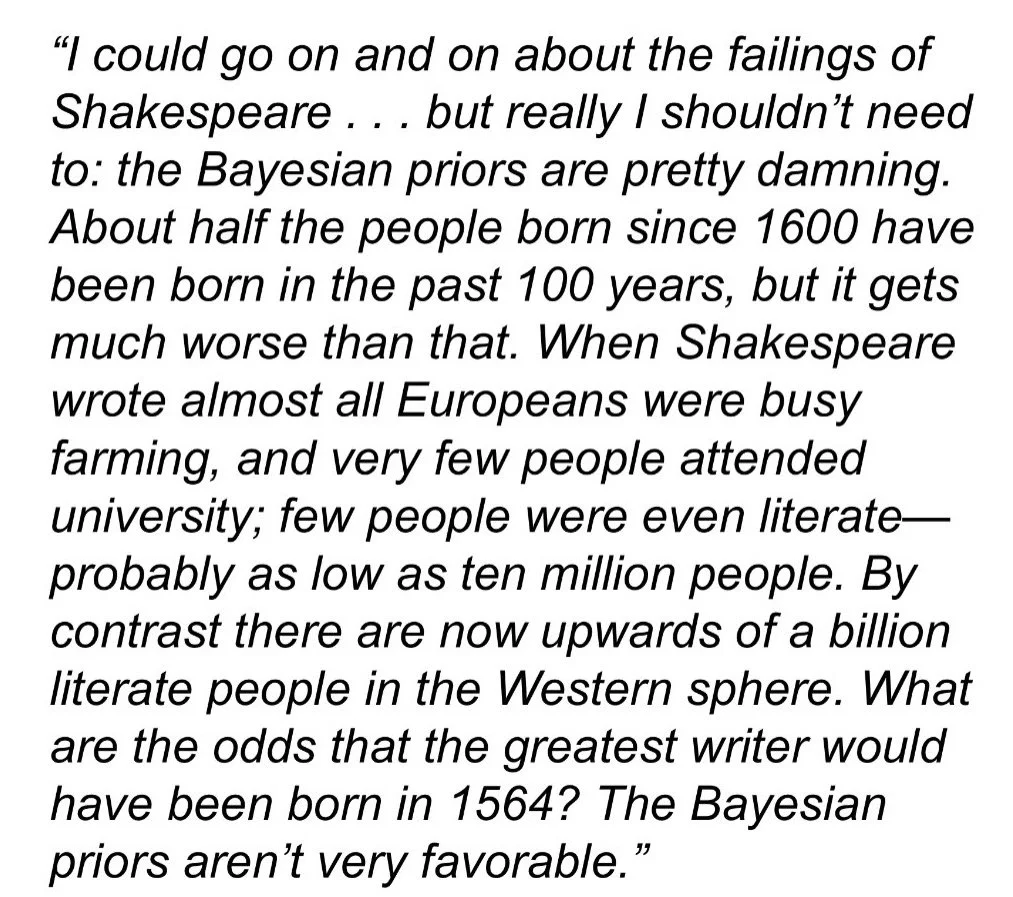 Architeuthis @awful.systems
Architeuthis @awful.systems It's not always easy to distinguish between existentialism and a bad mood.
And GPT-4.5 is terrible for coding, relatively speaking, with an October 2023 knowledge cutoff that may leave out knowledge about updates to development frameworks.
This is in no way specific to GPT4.5 but remains a weirdly undermentioned albatross about the neck of the entire LLM code-guessing field, probably because the less you know about what you told it to generate the likelier you are to think it's doing a good job, and the enthusiastically satisfied customer reviews in social media that I've interacted with certainly seemed to skew toward less-you-know types.
Even when the up-to-date version release happened before the cut-off point you are probably out of luck, since the newer version is likely way underrepresented in the training data compared to the previous versions that people may have been using for years by that point.
Nothing in my experience with LLMs or my reading of the literature has ever led me to believe that prompting one to numerically rate something and treating the result as meaningful would be a productive use of someone's time.
Still occasionally think about that bit in the o1 white paper where the openai researchers innocuously pose the question of what if our benchmarks for detecting hallucinations are shit actually, wouldn't that be something.
Implicitly assuming that the technology to terraform Mars is just around the corner is the we'll become profitable once we hit AGI of space exploration.
In todays ACX comment spotlight, Elon-anons urge each other to trust the plan:

image text
Just had a weird thought. Say you're an eccentric almost-trillionare, richest person in history. You have a boyhood dream you cannot shake: get to Mars. As much as you've accomplished, this goal still eludes you. You come to the conclusion that only a nation-state -- one of the big ones -- can accomplish this.
Wouldn't co-opting a superpower nation-state be your next move?
in order to dissuade hypothetical agents from blackmailing you
There's also a whole thing with Yud accepting the many worlds interpretation as obvious truth that leads to (some) rationalists believing that getting killed in one timeline helps your surviving parallel selves by bolstering your case of being unblackmailable by said hypothetical agents, who are also from the future, which is why you can't negotiate with them directly.
Also "return the offense thousandfold" figures in LaVeyan satanism I think (cross referencing unsuccessful; too many black metal bands in search results) as a counterpoint to by far the least observed christian guideline of turn-the-other-cheek.
Vox happens to be downstream of EA money, coincidentally.
Lesbionest, there is no better proxy for polygenic fitness than your total word count at lesswrong and acx.
Baldness just makes you more aerodynamic, and in our eugenics enabled charter city/network state/seastead you'll be getting assigned a state sponsored waifu anyway (terms and conditions may apply, like being not unprovably not related to persons of dubious genetic heritage).
In a completely unexpected turn of events this new experiment in mainstreaming eugenics is being currently boosted by siskind.
Could also be don't worry about deepseek type messaging that addresses concerns without naming names, to tell us that a drastic reduction in infrastructure costs was foretold by the writing of St Moore and was thus always inevitable on the way to immanentizing the AGI, ἀλληλούϊα.
It’s like you founded a combination of an employment office and a cult temple, where the job seekers aren’t expected or required to join the cult, but the rites are still performed in the waiting room in public view.
chef's kiss
The surface claim seems to be the opposite, he says that because of Moore's law AI rates will soon be at least 10x cheaper and because of Mercury in retrograde this will cause usage to increase muchly. I read that as meaning we should expect to see chatbots pushed in even more places they shouldn't be even though their capabilities have already stagnated as per observation one.
- The cost to use a given level of AI falls about 10x every 12 months, and lower prices lead to much more use. You can see this in the token cost from GPT-4 in early 2023 to GPT-4o in mid-2024, where the price per token dropped about 150x in that time period. Moore’s law changed the world at 2x every 18 months; this is unbelievably stronger.
Saltman has a new blogpost out he calls 'Three Observations' that I feel too tired to sneer properly but I'm sure will be featured in pivot-to-ai pretty soon.
Of note that he seems to admit chatbot abilities have plateaued for the current technological paradigm, by way of offering the "observation" that model intelligence is logarithmically dependent on the resources used to train and run it (i = log( r )) so it's officially diminishing returns from now on.
Second observation is that when a thing gets cheaper it's used more, i.e. they'll be pushing even harded to shove it into everything.
Third observation is that
The socioeconomic value of linearly increasing intelligence is super-exponential in nature. A consequence of this is that we see no reason for exponentially increasing investment to stop in the near future.
which is hilarious.
The rest of the blogpost appears to mostly be fanfiction about the efficiency of their agents that I didn't read too closely.
a lot of kids
They had 3 kids last time they came up, which despite their posturing is not really a notable amount, and they're both nearing their 40s, so it's unlikely they'll hit quiverfull numbers.
"Genetic Enhancement: Prediction Markets for Future People" by Jonathan Anomaly
What a completely cursed presentation title. According to the first youtube transcription service that pops up on google, he means that we should use prediction markets to find out which diseases will be curable/treatable in the next however many years so we can prioritize accordingly when doing polygenetic embryo screening based family planning.
Eugenics enjoyer quotient: Mr Anomaly is an iq enthusiast who goes on to talk about how genetic screening starts at choosing a suitable partner. Also, we should establish something like a polygenic health index that represents an individual's genetic health to better systematize selection. This will be based on the individual's known genetics as well as family history, I'm assuming because getting tricked into marrying someone with a schizophrenic great uncle or an obese cousin is a serious concern for him.
This presentation came up on the subject of how Cremieux/TP0/Lasker got invited to give a talk in Stanford if he's only known for his race science bullshit while otherwise unaffiliated, and the answer is that the school of business faculty who organized the talks was into forecasting markets and almost definitely met him in this event.
So we have the broader rationalist cultic milieu to once again thank for bringing terrible people together, I guess.
Penny Arcade weighs in on deepseek distilling chatgpt (or whatever actually the deal is):

You misunderstand, they escalate to the max to keep themselves (including selves in parallel dimensions or far future simulations) from being blackmailed by future super intelligent beings, not to survive shootouts with border patrol agents.
I am fairly certain Yud had said something very close to that effect in reference to preventing blackmail from the basilisk, even though he tries to no-true-scotchman zizians wrt his functional decision 'theory' these days.
Distilling is supposed to be a shortcut to creating a quality training dataset by using the output of an established model as labels, i.e. desired answers.
The end result of the new model ending up with biases inherited from the reference model should hold, but using as a base model the same model you are distilling from would seem to be completely pointless.
The 671B model although 'open sourced' is a 400+GB download and is definitely not runnable on household hardware.
Advent of Code 2024 - Historian goes looking for history in all the wrong places
copy pasting the rules from last year's thread:
>Rules: no spoilers.
>The other rules are made up aswe go along.
>Share code by link to a forge, home page, pastebin (Eric Wastl has one here) or code section in a comment.
New article from reflective altruism guy starring Scott Alexander and the Biodiversity Brigade
This post discusses the influence of human biodiversity theory on Astral Codex Ten and other work by Scott Alexander.

Would've been way better if the author didn't feel the need to occasionally hand it to siskind for what amounts to keeping the mask on, even while he notes several instances where scotty openly discusses how maintaining a respectable facade is integral to his agenda of infecting polite society with neoreactionary fuckery.
It can't be that the bullshit machine doesn't know 2023 from 2024, you must be organizing your data wrong (wsj)
>AI Work Assistants Need a Lot of Handholding
> Getting full value out of AI workplace assistants is turning out to require a heavy lift from enterprises. ‘It has been more work than anticipated,’ says one CIO.
aka we are currently in the process of realizing we are paying for the privilege of being the first to test an incomplete product.
>Mandell said if she asks a question related to 2024 data, the AI tool might deliver an answer based on 2023 data. At Cargill, an AI tool failed to correctly answer a straightforward question about who is on the company’s executive team, the agricultural giant said. At Eli Lilly, a tool gave incorrect answers to questions about expense policies, said Diogo Rau, the pharmaceutical firm’s chief information and digital officer.
I mean, imagine all the non-obvious stuff it must be getting wrong at the same time.
> He said the company is regularly updating and refining its data to ensure accurate results from AI tools accessing it. That process includes the organization’s data engineers validating and cleaning up incoming data, and curating it into a “golden record,” with no contradictory or duplicate information.
Please stop feeding the thing too much information, you're making it confused.
> Some of the challenges with Copilot are related to the complicated art of prompting, Spataro said. Users might not understand how much context they actually need to give Copilot to get the right answer, he said, but he added that Copilot itself could also get better at asking for more context when it needs it.
Yeah, exactly like all the tech demos showed -- wait a minute!
> [Google Cloud Chief Evangelist Richard Seroter said] “If you don’t have your data house in order, AI is going to be less valuable than it would be if it was,” he said. “You can’t just buy six units of AI and then magically change your business.”
Nevermind that that's exactly how we've been marketing it.
Oh well, I guess you'll just have to wait for chatgpt-6.66 that will surely fix everything, while voiced by charlize theron's non-union equivalent.
Generating (often non-con) porn is the new crypto mining
And now I feel like I need to take a shower. Ugh.

An AI company has been generating porn with gamers' idle GPU time in exchange for Fortnite skins and Roblox gift cards
> "some workloads may generate images, text or video of a mature nature", and that any adult content generated is wiped from a users system as soon as the workload is completed.
> However, one of Salad's clients is CivitAi, a platform for sharing AI generated images which has previously been investigated by 404 media. It found that the service hosts image generating AI models of specific people, whose image can then be combined with pornographic AI models to generate non-consensual sexual images.
Investigation link: https://www.404media.co/inside-the-ai-porn-marketplace-where-everything-and-everyone-is-for-sale/
SBF's effective altruism and rationalism considered an aggravating circumstance in sentencing
Sam Bankman-Fried maintains that his crimes were victimless and resulted in zero losses, and therefore warrant only six years of imprisonment. Prosecutors argue that 40–50 years are justified.

For thursday's sentencing the us government indicated they would be happy with a 40-50 prison sentence, and in the list of reasons they cite there's this gem:
> 4. Bankman-Fried's effective altruism and own statements about risk suggest he would be likely to commit another fraud if he determined it had high enough "expected value". They point to Caroline Ellison's testimony in which she said that Bankman-Fried had expressed to her that he would "be happy to flip a coin, if it came up tails and the world was destroyed, as long as if it came up heads the world would be like more than twice as good". They also point to Bankman-Fried's "own 'calculations'" described in his sentencing memo, in which he says his life now has negative expected value. "Such a calculus will inevitably lead him to trying again," they write.
Turns out making it a point of pride that you have the morality of an anime villain does not endear you to prosecutors, who knew.
Bonus: SBF's lawyers' list of assertions for asking for a shorter sentence includes this hilarious bit reasoning:
> They argue that Bankman-Fried would not reoffend, for reasons including that "he would sooner suffer than bring disrepute to any philanthropic movement."
Rationalist org bets random substack poster $100K that he can't disprove their covid lab leak hypothesis, you'll never guess what happens next
rootclaim appears to be yet another group of people who, having stumbled upon the idea of the Bayes rule as a good enough alternative to critical thinking, decided to try their luck in becoming a Serious and Important Arbiter of Truth in a Post-Mainstream-Journalism World.
This includes a randiesque challenge that they'll take a $100K bet that you can't prove them wrong on a select group of topics they've done deep dives on, like if the 2020 election was stolen (91% nay) or if covid was man-made and leaked from a lab (89% yay).
Also their methodology yields results like 95% certainty on Usain Bolt never having used PEDs, so it's not entirely surprising that the first person to take their challenge appears to have wiped the floor with them.
Don't worry though, they have taken the results of the debate to heart and according to their postmortem blogpost they learned many important lessons, like how they need to (checks notes) gameplan against the rules of the debate better? What a way to spend 100K... Maybe once you've reached a conclusion using the Sacred Method changing your mind becomes difficult.
I've included the novel-length judges opinions in the links below, where a cursory look indicates they are notably less charitable towards rootclaim's views than their postmortem indicates, pointing at stuff like logical inconsistencies and the inclusion of data that on closer look appear basically irrelevant to the thing they are trying to model probabilities for.
There's also like 18 hours of video of the debate if anyone wants to really get into it, but I'll tap out here.
quantian's short writeup on the birdsite, will post screens in comments
pdf of judge's opinion that isn't quite book length, 27 pages, judge is a microbiologist and immunologist PhD
pdf of other judge's opinion that's 87 pages, judge is an applied mathematician PhD with a background in mathematical virology -- despite the length this is better organized and generally way more readable, if you can spare the time.
rootclaim's post mortem blogpost, includes more links to debate material and judge's opinions.
edit: added additional details to the pdf descriptions.
Hi, I'm Scott Alexander and I will now explain why every disease is in fact just poor genetics by using play-doh statistics to sorta refute a super specific point about schizophrenia heritability.
edited to add tl;dr: Siskind seems ticked off because recent papers on the genetics of schizophrenia are increasingly pointing out that at current miniscule levels of prevalence, even with the commonly accepted 80% heritability, actually developing the disorder is all but impossible unless at least some of the environmental factors are also in play. This is understandably very worrisome, since it indicates that even high heritability issues might be solvable without immediately employing eugenics.
Also notable because I don't think it's very often that eugenics grievances breach the surface in such an obvious way in a public siskind post, including the claim that the whole thing is just HBD denialists spreading FUD:
> People really hate the finding that most diseases are substantially (often primarily) genetic. There’s a whole toolbox that people in denial about this use to sow doubt. Usually it involves misunderstanding polygenicity/omnigenicity, or confusing GWAS’ current inability to detect a gene with the gene not existing. I hope most people are already wise to these tactics.
Reply guy EY attempts incredibly convoluted offer to meet him half-way by implying AI body pillows are a vanguard threat that will lead to human extinction...
... while at the same time not really worth worrying about so we should be concentrating on unnamed alleged mid term risks.
EY tweets are probably the lowest effort sneerclub content possible but the birdsite threw this to my face this morning so it's only fair you suffer too. Transcript follows:
Andrew Ng wrote: >In AI, the ratio of attention on hypothetical, future, forms of harm to actual, current, realized forms of harm seems out of whack. > >Many of the hypothetical forms of harm, like AI "taking over", are based on highly questionable hypotheses about what technology that does not currently exist might do. > >Every field should examine both future and current problems. But is there any other engineering discipline where this much attention is on hypothetical problems rather than actual problems?
EY replied: >I think when the near-term harm is massive numbers of young men and women dropping out of the human dating market, and the mid-term harm is the utter extermination of humanity, it makes sense to focus on policies motivated by preventing mid-term harm, if there's even a trade-off.
Turns out Altman is a lab-leak covid truther, calls virus 'synthetic' according to Spectator piece on AI risk.
> Sam Altman, the recently fired (and rehired) chief executive of Open AI, was asked earlier this year by his fellow tech billionaire Patrick Collison what he thought of the risks of synthetic biology. ‘I would like to not have another synthetic pathogen cause a global pandemic. I think we can all agree that wasn’t a great experience,’ he replied. ‘Wasn’t that bad compared to what it could have been, but I’m surprised there has not been more global coordination and I think we should have more of that.’
Rationalist literary criticism by SBF, found on the birdsite


original is here, but you aren't missing any context, that's the twit.
> I could go on and on about the failings of Shakespear... but really I shouldn't need to: the Bayesian priors are pretty damning. About half the people born since 1600 have been born in the past 100 years, but it gets much worse that that. When Shakespear wrote almost all Europeans were busy farming, and very few people attended university; few people were even literate -- probably as low as ten million people. By contrast there are now upwards of a billion literate people in the Western sphere. What are the odds that the greatest writer would have been born in 1564? The Bayesian priors aren't very favorable.
edited to add this seems to be an excerpt from the fawning book the big short/moneyball guy wrote about him that was recently released.
Quality sneer found on the birdsite


Transcription:
Thinking about that guy who wants a global suprasovereign execution squad with authority to disable the math of encryption and bunker buster my gaming computer if they detect it has too many transistors because BonziBuddy might get smart enough to order custom RNA viruses online.
